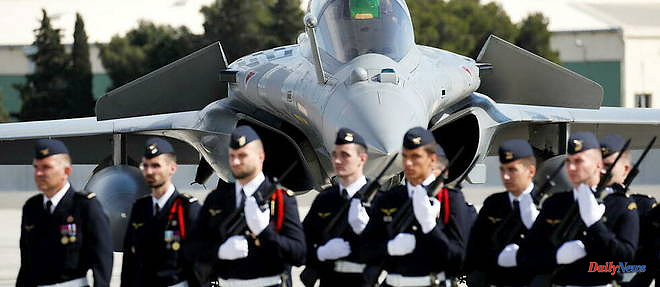The military programming bill, under debate in the National Assembly from Monday, provides for a sharp increase in the budget over the next seven years but leads to military equipment objectives by 2030 revised downwards.
The need identified for the armies amounts to 413.3 billion euros over seven years (2024-2030), i.e. 40% more than for the previous military programming law (LPM). The budget must be supplemented in successive steps: 3.1 billion euros in 2024, then an additional 3 billion per year from 2025 to 2027, and finally 4.3 billion more per year from 2028. The budget will reach 69 billion euros. euros in 2030. Heard by the deputies in committee, the defense industrialists in unison said they were "perfectly aware of the effort made by the Nation" despite the high level of public debt. If 400 billion euros are financed by budgetary appropriations, 13.3 billion will be financed by extra-budgetary resources, which are more uncertain.
An amendment adopted in committee plans to compensate them if they are missing. The Ministry of the Armed Forces defends an exercise in transparency when, according to him, this process has always existed. The need for a powerful army "remains generally consensual, it is the way of responding to it that gives rise to differences", we note within the executive: the communists are traditionally opposed to nuclear deterrence , the Greens do not want a future aircraft carrier, LFI challenges NATO membership
Faced with the return of war in Europe and the rise of international tensions, the LPM defines an army format. This depends on the desire to preserve sovereign means, first and foremost nuclear deterrence, but also alliances. Of the 413.3 billion, the ministry estimates the impact of inflation at 30 billion euros over the period.
Nuclear deterrence, due to its modernization (future ballistic missile submarines, M51 missiles and ANS4G), alone consumes 13% of credits. It is the "amount of life insurance", which at the same time makes it possible to have fewer conventional forces, judge Thomas Gassilloud, chairman of the Defense Committee.
The target of 275,000 soldiers and civilians (excluding reservists) is unchanged, but the credits increase from 87 to 98 billion euros over the period to improve remuneration and encourage them to stay in the army. Equipment (aircraft, armored vehicles, etc.) represents 268 billion euros, the budget devoted to their maintenance increases by 40% (49 billion euros), as does that of force training (65 billion).
The LPM also intends to remedy weaknesses highlighted by the conflict in Ukraine, in particular to increase ammunition stocks (16 billion euros, 45%) or surface-to-air defense devices (5 billion). Emphasis is also placed on "new fields of conflict", such as space (6 billion, 40%) or cyber (4 billion, 300%). Twice as much money will be spent on drones (5 billion euros), 5 billion on intelligence and two billion on special forces.
In a constrained framework, these increases lead to delays in the delivery of materials to after 2030, "even if we do not see the target again", according to Minister Sébastien Lecornu. Armies will receive 2,300 new armor over the period, 30% less than previously planned. In 2030, the Air Force will have 137 Rafale against an initial target of 185 and 35 A400M transport aircraft (against 50), and the Navy will only be able to count on three of the five defense and intervention frigates .
Sébastien Lecornu says "favor consistency over mass" to ensure that equipment and soldiers are actually operational. "We have long cut back on the activity of the forces and training to avoid political and industrial difficulties" by canceling orders for equipment, he lamented during the committee hearings.
A provision provides for the monitoring of the activities of former military personnel for the benefit of foreign entities. London had taken similar steps to end China's recruitment of British military pilots to train its own airmen. Several articles also set to music the "war economy" promoted by President Emmanuel Macron, in particular requisitions for the benefit of defense or the constitution of strategic stocks of raw materials and components.












